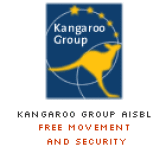Origin of the Kangaroo Group
After the first direct elections in June 1979, there existed two distinct streams of thought within the European Parliament on how best to develop the European Community. MEPs like Rudolf Luster, Gero Pfennig and Jochen van Aerssen (all PPE/CDU) were of the opinion that the time had come to put forward a proposal for a European Constitution. In response to this, Mr. Spinelli gathered together MEPs from different political sides to form a group whose aim was to make the European Parliament into a constitutional body. They called themselves the "Crocodile Club" after the restaurant in Strasbourg where they first met.
At around the same time; another group of MEPs was forming which felt that the Community should first regain its capacity to act before turning towards
major new goals. They argued that it was essential to prove that the Community was still able, even in the changed environment of the 1980‘s, to realise projects which the vast majority of its
citizens would consider advantageous. What was needed was the abolition of border controls between the Member States and of trade obstacles within the so-called Common Market. This group was made up
of Karl von Wogau and Basil de Ferranti .
Basil de Ferranti was appointed to the Parliament‘s Economic & Monetary Affairs Committee who in turn set up a sub-Committee to deal specifically with the Internal Market. It was this Committee
that toured the European Community capitals to persuade ministers of the need for the Internal Market. During one such visit, having talked to an Italian Minister who was totally supportive, Basil de
Ferranti then met his civil servant who said: "it doesn‘t matter what the minister says -- I make the proposals!"
Following these visits, a number of those taking part met to decide what action they could take in the European Parliament to raise the awareness of its members to the importance of the
market. Thus the "unofficial Kangaroo Group" was born. The members were Basil de Ferranti, Karl von Wogau, Kai Nyborg and Dieter Rogalla, sharing a particular interest in the free movement of
people. This early membership represented three different countries and differing political views: this has been the characteristic of the Group ever since.
The name was chosen at an early meeting of the Group when Dieter Rogalla, who had been to Australia, was wearing a kangaroo badge. The kangaroo seemed to be a particularly appropriate symbol
because of its peaceful nature and ability to take great leaps forward with an empty pouch over any boundaries.
The path taken to come to the completion of the Internal Market was a long and difficult one and will not be completed until a
monetary and economic union is realised in all Member States. This will remain one of the goals of the Kangaroo Group. Recently we discovered in an
Australian encyclopaedia a species of kangaroo called "Euros" -- Will this ultimately prove to be a good omen?
The Kangaroo Group aisbl
Rue Wiertz 11
B-1050 BRUSSELS
tel: 0032 2 280 60 95
fax: 0032 2 280 07 84
email: office@kangaroogroup.eu
internet: www.kangaroogroup.eu
We are transparent and registered:
Kangaroo Group EU Transparency Register Number:
81031887403-27


